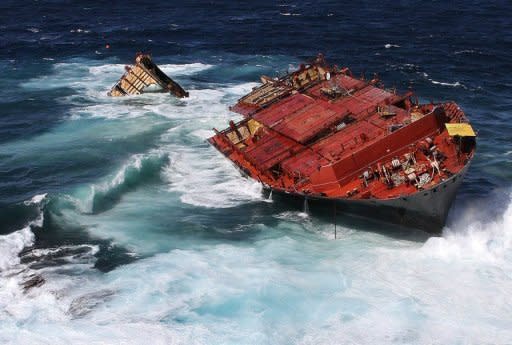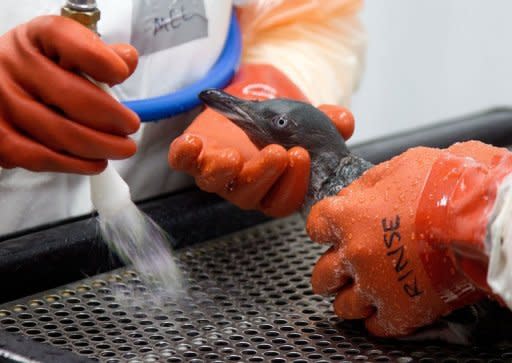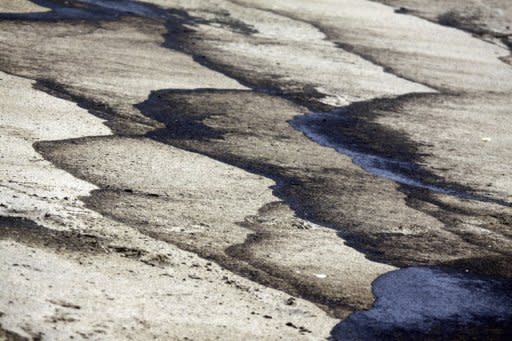Ship's captain jailed over New Zealand oil spill
The captain and second officer of a ship that caused New Zealand's biggest sea pollution disaster when it ploughed into an offshore reef were both jailed for seven months on Friday. The Filipino officers were in charge of the Liberian-flagged Rena when it hit the reef last year, releasing an oil slick that killed thousands of sea birds and fouled beaches in the North Island's pristine Bay of Plenty. Captain Mauro Balomaga and navigation officer Leonil Relon had pleaded guilty in February to a range of charges including attempting to pervert the course of justice by altering navigation records after the accident. They also admitted operating a ship in a dangerous manner and discharging harmful substances from the cargo vessel. Prosecutors told the Tauranga District Court on Friday that the pair ignored basic navigational practices when they attempted to take a short cut to reach port in the early hours of October 5 last year. Maritime New Zealand director Keith Manch welcomed the sentences, saying the ship's officers had to be held accountable for their actions. "This grounding has had significant consequences for the Bay of Plenty community and the country as a whole," he said. "Today marks a milestone in the response, which is still under way." The Rena hit the Astrolabe Reef 22 kilometres (14 miles) offshore in clear conditions as it steamed at full speed towards Tauranga, New Zealand's largest container port, becoming stuck on the submerged rocks. More than 300 tonnes of toxic fuel oil spewed from the vessel, creating an oil slick kilometres long, which washed onto beaches at the popular tourist spot, coating birds in thick black sludge. Environment Minister Nick Smith described it as New Zealand's worst maritime pollution disaster. The accident triggered public fury and a dangerous salvage operation which involved crews scrambling to pump the remaining oil from the Rena's fuel tanks as heavy seas pounded the stricken vessel and opened up deep cracks in its hull. An army of 5,000 volunteers was mobilised to clean up the shoreline of the bay, which contains marine reserves and teems with wildlife including whales, dolphins, penguins, seals and rare sea birds. The vessel eventually broke up on the reef in January and the stern sank, further complicating a salvage operation which is still continuing as crews remove shipping containers from the bow. Manch said Balomaga and Relon had altered the Rena's course without plotting what lay ahead and failed to recognise how hazardous the reef was when it showed up on the ship's radar, dismissing it as a false echo or small vessel. He said the pair then tried to cover up their actions by altering log entries and navigational records. "This offending is also very serious in that it caused genuine confusion for investigators trying to piece together the events that led to the grounding," he said. The government has estimated the disaster clean-up will cost NZ$130 million ($98 million), most of which will be covered by the Rena's owner, the Greece-based Costamare Shipping Company, and its insurers. A Philippine sailors' support group said the owners of the vessel should share the blame for the disaster. Investigators should look into the possibility they had ordered the captain to alter course to save fuel, said Edwin de la Cruz, president of the Manila advocacy group International Seafarers' Action Centre. "The captain should not be made a scapegoat because he could not have acted without orders," de la Cruz told AFP. "The act of the captain is the act of shipowners." De la Cruz said up to 380,000 Filipino sailors are aboard the world's merchant marine fleet at any one time, and have been the single largest nationality for the past 25 years.




